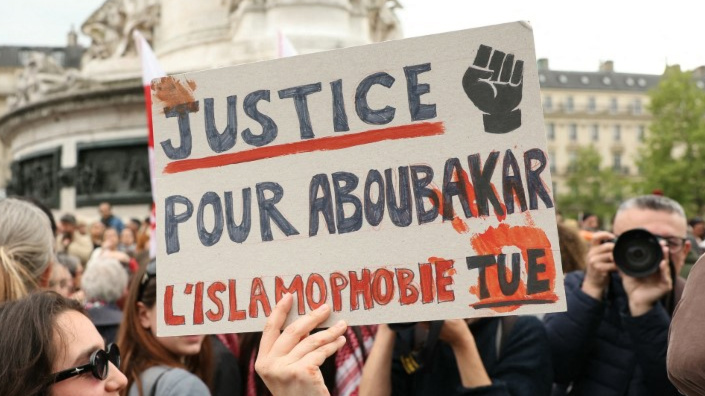Late last month, the news broke: Aboubakar Cisse, a young Black Muslim man of Malian descent, had been killed inside a mosque in southern France.
Initially described in the media as a personal dispute, that narrative quickly fell apart as a local prosecutor announced the case was being investigated as “an act with Islamophobic connotations”.
Cisse wasn’t just killed; he was targeted in a sacred space. After cleaning the mosque for Friday prayers, surveillance footage showed him teaching another man how to pray. As Cisse prostrated himself in prayer, the other man pretended to follow along before pulling out a knife, stabbing him 57 times and shouting vile Islamophobic slurs.
The emotional wreckage this has caused is immense. Since the footage surfaced, each detail has deepened the Muslim community’s collective grief, and ignited a seething anger.
Like many others, I’ve found myself asking the same question over and over: could we have prevented this?
I wish I could say I was shocked. But as a visibly Muslim French woman who leads a pan-European network of Muslim youth and student groups, I know we’ve seen the warning signs for years. These signs have been deliberately ignored.
Cisse was young, Black and Muslim. He quietly served his community, like so many people who sustain the spaces where others find peace. And yet he also embodies everything that political hate merchants have spent years dehumanising.
New MEE newsletter: Jerusalem Dispatch
Sign up to get the latest insights and analysis on
Israel-Palestine, alongside Turkey Unpacked and other MEE newsletters
Decades of bigotry
Even with stark video evidence, many are still refusing to label this incident as a hate crime at the convergence of Islamophobia and anti-Black racism. It was not a personal quarrel, but the inevitable outcome of decades of normalised bigotry.
A Bosnian French man has been arrested in the case. His lawyer denies that Cisse was targeted because of his religion, but to Abdallah Zekri, vice president of the French Council of the Muslim Faith, the evidence is clear: “This is an Islamophobic crime, the worst of all those committed in France against our community.”
This isn’t about one deranged individual. It’s about an entire ecosystem of hate, one that is propped up by state policies cloaked in neutrality, media narratives that cast Muslims as threats, and daily indignities faced by Muslim students, workers and families.
A Europe where Cisse could be murdered in his own mosque cannot call itself a union of equality, freedom and human rights
Cisse’s brutal killing is not an anomaly, but rather the logical endpoint of a political project that turns fears into votes and citizens into targets.
When a veiled Muslim woman in France has an 80 percent lower chance of landing a job interview; when Muslim schools face disproportionate scrutiny; and when a man can be murdered in his own mosque, nowhere is truly safe for Muslims in France.
We have raised the alarm for years. We’ve asked for dialogue, protection and dignity. But our calls have been been met with locked doors and institutional exclusion.
This is no longer political inaction. It is complicity.
I no longer blame only hate-spewing politicians who scapegoat Muslims for electoral gain – those who just weeks ago screamed “down with the veil”, and who glorify colonial nostalgia, systematically refusing to see Muslim citizens as part of the European “we”.
I also blame those who acknowledge our pain in public, while ignoring our warnings behind closed doors. From local councillors to European institutions, their silence is not neutral; it is deadly.
How many more?
Across France, people have gathered in spontaneous vigils to mourn Cisse. And this was not the first time.
After Marwa el-Sherbini’s murder in 2009, we asked: how many more? After the murder of Makram Ali in 2017, again we asked: how many more? But now, after the brutal killing of Cisse, we are done asking. We are shouting: enough.
How many more lives must Islamophobia claim before it is treated as the structural threat it is? How many more mosques must become crime scenes before the safety of European Muslims becomes a non-negotiable political priority?

French Muslims find ‘Islamophobic’ violence is overlooked after mosque murder
Read More »
We don’t need more token consultations and empty statements. We need urgent and systemic transformation. Fighting Islamophobia means treating Muslims as partners in shaping Europe, not as threats to be managed. It means recognising Islamophobia as a form of racism rooted in colonial legacies, not simply as religious intolerance.
The EU anti-racism strategy must be co-created with Muslim communities. It must acknowledge the intersectional nature of discrimination, and avoid fragmenting the struggle by isolating Islamophobia from broader anti-racism efforts.
If we fail to connect the dots, ignoring how Islamophobia intersects with anti-Blackness and structural exclusion, then the most marginalised people will continue to pay the price for Europe’s indifference.
Despite the grief, fear and anger, mosques will remain spaces of welcome and dignity – just as Cisse embodied. We owe this to our youth, to our future, and to the very idea of Europe.
Because a Europe where Cisse could be murdered in his own mosque cannot call itself a union of equality, freedom and human rights.
The views expressed in this article belong to the author and do not necessarily reflect the editorial policy of Middle East Eye.

